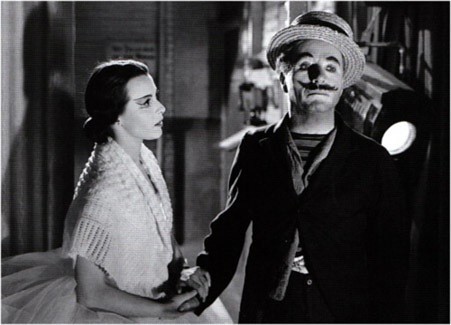These final two—along with The Great Dictator—work on a different level than the silents, not technically, but more in their rhythm and tone. My impression of Chaplin is colored by the first pictures I saw from him—Modern Times, The Gold Rush, and City Lights, in that order. I saw those when I was quite stressed, and I suppose they're what make me ascribe Chaplin with that cure-for-depression sort of value. Really, though, I think those movies are where Chaplin is at his most fluid level—unabashedly sentimental human comedy with just a touch of political undercurrent. Those movies have blood flowing through them that makes them feel alive; they have a love of life through good and bad.
Of all the Chaplin movies I've seen, The Great Dictator stands as the most stagnant. This is hardly to say I dislike it, just that by comparison, it seems more awkward than the earlier ones—like Chaplin still hasn't acclimatized to the sound era. Nevertheless, it's arguably his most passionate work, and you can really see Chaplin's nationalism shining through as he satirizes Hitler's speech foibles. Yet Chaplin comes across as an impassioned, yet overly verbose speaker; it's his spirit more than his technique that I admire. I think his capabilities are much improved in Monsieur Verdoux, and maybe those seven feature-less years were worth it.
Monsieur Verdoux is a vast improvement over The Great Dictator, and is filled with macabre humor that'd put Kubrick to shame (as if that was really difficult). The Shadow-of-a-Doubt-esque premise allows Chaplin to exercise his abilities against his usual type, yet I wouldn't say his new character Verdoux is a diametric opposite. It seems more an evolution of the lovable tramp, because Chaplin's still inspiring our sympathy; he's just added to the complexity of his usual sentimentality. I still see artifacts of The Great Dictator here—namely Chaplin's overly verbose preaching—but the wicked, cinematic criticisms towards Verdoux's victims make up for it.
Limelight continues in Monsieur Verdoux's footsteps of dramatizing its ideas rather than resorting to the Great Dictator's soapbox. Indeed, I almost want to call it Chaplin's best movie if only because of the simple, gentle nakedness of it all. The female leads in his movies, to me, always seem a bit of a self-indulgence on Chaplin's part, but I think he handles it with greater maturity here. His Romantic chivalry is still here in all its glory, but it feels more realistic in Limelight. There's such a poignancy here that, dare I say, it even puts City Lights to shame. It's a lot of little things, like how he wants to be the inspiring voice for Terry, yet he's afraid to reveal his dismal "comeback" performance. Or that almost-too-hard slap to shake her stage fright; it's as endearing as it is startling. The caring beneath that nonchalant, almost indifferent shrug isn't hard to find, yet you can see why Calvero puts up a front. It wouldn't be fair for Terry to tie herself to someone of his age and would the few years of happiness be worth it?
I can't decide where to place these last two. Certainly, both are superior to The Great Dictator. But how can I compare such vastly different works? I've always put Modern Times and The Gold Rush near the top with City Lights not far behind. Arguably, I'd probably be in the mood for the earlier silent types more frequently, but Monsieur Verdoux stands as an excellent plunge into new territory, and I don't think there could be a more perfect adieu to stardom than Limelight.

No comments:
Post a Comment